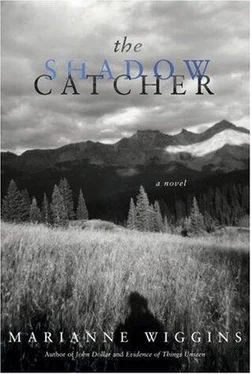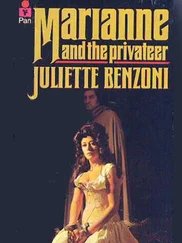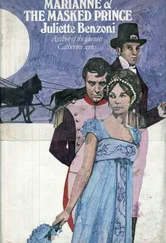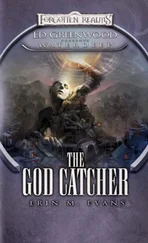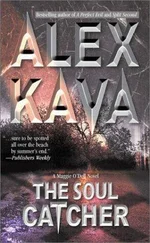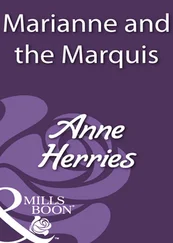“I can’t watch you suffer.”
“I would watch you struggle. If you asked me to. If our roles were reversed.”
“I don’t know that I could ask someone to do that. When there is something else that can be done.”
More , he said.
“—more broth?” He had drained the bowl.
“More talk. Keep talking. Tell me everything you know. The painting on the sea chest. Did your father paint it?”
She forced herself to worry less and entertain him more. “Not my father’s style — can’t you see the difference? This painting on the sea chest is a figurative one, realistic. My father’s style is moody, more impressionistic. But this was one of his favorite paintings, the original, this is a copy, of course, a rather good one, except for the second-rate colors that were used. Could be that is why I purchased it, because my father was so fond of the original — I’ve forgotten the Dutch artist’s name — or perhaps he was Flemish — sixteenth century, nevertheless, and you can see that by then the Europeans had answered the quandaries posed by the subject of perspective because this painting — it’s called Icarus , that much I remember — here you see the plowman in the foreground, his figure proportionally larger than the distant ship behind him, even though no human, naturally, is larger than a ship—”
“What does ‘Icarus’ mean?”
“—I’m sorry?”
“Icarus. What does it mean? What language is it?”
“Greek. I don’t know that the name means anything. Like ‘John.’ Or ‘Edward.’”
“Icarus is a person’s name?”
“Yes, this is Icarus here, in the right hand corner of the painting with his legs sticking up from where he’s fallen in the water.”
His steady look.
“The boy who flew too close to the sun?”
Uncomprehending.
“The Greek myth,” Clara said.
“Yes, go on. I’ve heard of them. Legends from the ancient past.”
“Legends, yes, but legends only now. At the time that they were told they were believed to be as factual and truthful as this textbook.” She held up the ANATOMIE.
“What happened to them?”
“The Greeks?”
“The myths.”
“People stopped believing in the truth of them.”
“Ah. Because they were not true, at heart.”
“People stopped believing in the magic of them, then.”
“How does that happen?”
“—loss of faith? I suppose most often one kind of faith replaces another. It’s not faith that is transformed, but the object of it.”
“Then what did the Greeks believe in when they lost faith in myths?”
“Other myths, I suppose. Christianity. These …” She held up the pages of the saints in Giotto’s paintings.
“Tell me the myth of Icarus,” he said, “so I can decide if I’ll believe it.”
“Not a good myth to start with, Edward, for someone who’s just fallen off a roof…”
She told him the myth, which could be recited in its full in four brief sentences and then he asked her how the Icarus sea chest had come into her possession and she told him that, too, about the money from Lodz and who Lodz was and how she and Hercules had gone to the market to shop and she’d bought the chest with all the books inside and how Hercules had spent his full ten dollars on a suit of clothes that he’d already outgrown.
“The suit was handsome?”
“He was very pleased with it.”
“I would have done the same. You’re laughing?”
“He’s a boy, Edward — a boy of eight — and you’re a man. I think you would not have squandered your entire fortune on a suit of clothes that you were destined to outgrow.”
“Oh but as most men from a meager background I am attracted to fine things, fine clothes.” He ran his hand along the counterpane again, in contemplation of its weave. “Your family must have been, at some time, wealthy, I suspect.”
“Wealthy, no. Had they been wealthy I would not be here. Existing on your family’s charity. Living from a sea chest.”
“Wealthy enough to buy your education, though. You are well educated, I observe.”
“If I appear that way it is because my primary education derived from my parents’ company. They were greatly learned people. Far better schooled than I.”
“So you see the root cause of my disability. Given the company that I was made to keep as a small boy.”
“You mean your father—”
“But I taught myself to read. The Leatherstocking Tales . Do you know these books?”
“Fenimore Cooper,” Clara vaguely recalled.
“ The Deerstalker. The Pathfinder . Oh they’re magnificent. The Last of the Mohicans . I’ve read them all. You must read them. You must make them necessary reading. I’ll lend them to you. In fact, in honor of your taking time to share your books from your sea chest with me, I’m going to call you Scout. That’s what Hawk-eye, the Pathfinder, is — a scout. And that’s what you’ll be for me. My Scout. That’s going to be my name for you.”
As he’d yet to address her by any name, especially her own, Clara accepted this false baptism with reluctant gratitude.
“Are there any books in that sea chest, Scout, that you could read to me — in English?”
“English, yes, aye, aye, sir, let’s just see—” She went hunting again, among the books and mementos. “—I brought along some favorite novels of my parents, here we are—” She stood up holding several volumes. “Louisa May Alcott, no, that won’t do—”
“A woman writer?”
“—even worse, Edward. A woman writer writing one called Little Women —”
He looked, almost on cue, newly pained.
“—Henry James…I think not…here we are — one ofmy father’s favorites…make yourself comfortable, Edward, you are in for a treat…” She rearranged the pillows around his head, removed the tray, tested the heat from the stones, then settled in beside him on the bed. “Chapter the First,” she read, “in which
‘The Author gives some account of himself and family — His first inducements to travel — He is shipwrecked and swims for his life — Gets safe on shore in the country of Lilliput — Is made a prisoner and carried up the country.’”
“What is the title of this adventure, Scout?”
“ Gulliver’s Travels . Irish. But in English nonetheless…”
She read without a pause for what must have been at least an hour before she felt him doze beside her. She sat still and watched him sleep for several moments then she slid silently from the bed leaving the book beside him on the pillow. She changed quickly from the shift into a skirt and blouson in anticipation of the physician’s arrival, then she left the room, keeping the door ajar. She lit the flame beneath the kettle and set out a tea service to refresh the physician, then considered finding a nightshirt or clean clothes for Edward. Enough time had elapsed for the Indians to have reached someone for help, she thought, as she crossed the open ground between the house and the barn, pausing only slightly to wonder at the wood aroma in the air — not fresh timber, exactly, more like the smell of a cold hearth. The light was strangely eerie, as if a storm were coming, though the sky was still. She entered the barn by the door to the bunkhouse where Hercules and Asahel slept at night and then she realized she hadn’t visited these quarters in months. There were two beds, neatly made up — and a closed door, leading to further rooms that she had never visited, and as soon as she opened the door she knew she had entered on Edward’s presence, into the room where Edward dreamed and slept. Side chapel , she immediately thought. On those few occasions when she had entered into one of St. Paul’s cathedrals she had been struck by the asceticism of the side chapels, the niches, those unadorned recesses washed in reverential light where people went to be alone, with God. That’s what Edward’s room was like, a sanctuary pressed into service by unrelenting solitude. Everything was placed , as if on an altar: nothing was superfluous. There was a bed, a chest of drawers, a straight-back chair, a writing table. Nothing on the walls, no windows. There was something very masculine about the look and feel of it, its readiness for duty, its spartan abnegation of unnecessary frill. On the writing table, an oil lamp with a box of sulphur matches, a dictionary, a jar of ink and a single pen. A stone, riddled through with veins of green. A small gold nugget. On the chest of drawers, standing side by side, the collected Leatherstocking Tales , a cheap edition, pages foxed and marked in Edward’s hand in pencil. She slid the top drawer of the chest open to discover cotton shirts, three of them, starched and pressed and folded, and a pair of silk pyjamas, black, of the kind you saw on Chinamen, with braided toggles on the top and a drawstring waist on bottom, same as Edward’s doeskin pants. The middle and the bottom drawers were empty. Why would Edward build a house, she wondered, an entire edifice to house his family, and then decide to live apart? It made no sense to her. In a corner of the room his carved, polished walking stick stood against the wall next to a canvas knapsack in which she found a pair of laundered stockings and his razor. She took these, the walking stick, a shirt and the pyjamas, and was about to leave when she noticed a slanted cubby door plumb with the wall, into which a grown adult would have to duck to enter. Thinking it a closet where Edward might have kept his boots and shoes and other clothing she unlatched the door and pulled it open and found herself facing a two-storey-like stall, faced with cedar, entirely dark — a darkroom — but for a seam of light coming from the ceiling which she realized must be the outline of a window in the roof. Groping, she found a cord and pulled it and a thick black shade snapped back to reveal not a cubby nor a closet but a large well-organized meticulous workroom, half the size of her father’s attic studio on the top floor of the St. Paul house. “No one is as organized in his work as a sailor has to be,” her father had once told her, “for him it’s life-or-death. Everything must have a place and everything must be in place. Shipshape. Like a painter’s palette. Everything is organized. Every color separate. Everything at hand when needed. I could do it in the dark, you see? Work my palette with my eyes closed. Sail it. Like a captain in a good ship on the sea. That’s what my palette is: my ship.” So was the room that she was standing in, a sort of regulated vessel. Shipshape. Ordered. Rows of corked brown bottles organized by size labeled AMMONIUM IRON OXALATE, FORMALDEHYDE, FERRIC AMMONIUM CITRATE, POTASSIUM FERRICYANIDE. There were empty beakers, crude brushes, more like spatulas, with flattened edges, a jar marked WATER (RAIN). There were hinged-back wooden boxes and rectangles of glass and a sheaf of thick dense paper, still she was slow to fathom what it all amounted to until she saw the pictures on the wall. Until she saw the camera.
Читать дальше
